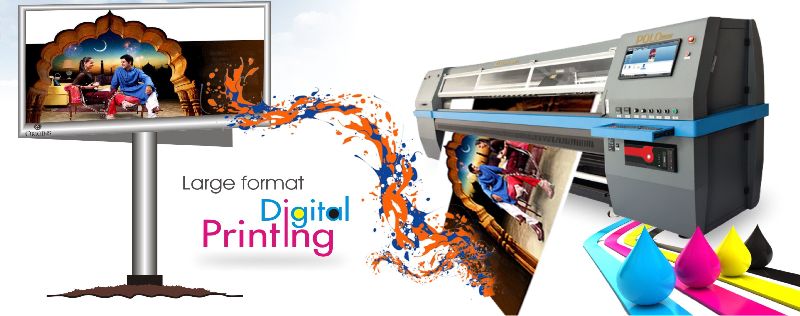Not known Details About Digital Printing
Not known Details About Digital Printing
Blog Article
The Digital Printing Ideas
Table of ContentsThe Main Principles Of Digital Printing Rumored Buzz on Digital PrintingNot known Incorrect Statements About Digital Printing Some Of Digital PrintingThe Best Strategy To Use For Digital PrintingWhat Does Digital Printing Do?The Of Digital PrintingExcitement About Digital Printing
Customization also permits companies to stand apart in a crowded market by producing one-of-a-kind advertising and marketing products that differentiate them from their competitors. One of the primary advantages of digital printing is the capability to publish variable information. Each published item can be distinct, permitting companies to produce customized marketing materials that talk straight to their target audience.Digital printing likewise permits for personalization in the layout of advertising materials (Digital Printing). With electronic printing, companies can develop designs that are one-of-a-kind and tailored to their certain needs.
Little Known Questions About Digital Printing.
By printing smaller amounts of advertising products, organizations can decrease waste and stay clear of the demand for excess supply. Digital printing is also functional.
By utilizing various materials and formats, businesses can develop distinct advertising products that attract attention from their competitors and stand out from their target audience. Digital printing likewise offers uniformity. With standard printing techniques, there is typically variant in between prints because of distinctions in ink insurance coverage, pressure, and various other variables.
This uniformity can help construct client depend on and integrity, showing that the company is devoted to supplying premium products. Consistency is especially crucial for organizations that wish to develop customer trust fund and integrity. By making sure that every print corresponds, companies can show that they are committed to giving high-grade products and taking note of the details.
Little Known Facts About Digital Printing.

In addition, electronic printing generates much less waste due to the fact that it can print as needed and in smaller sized quantities, lowering the requirement for excess stock and materials. Digital printing likewise utilizes much less power contrasted to standard printing techniques. Digital printers do not call for as much power to run, as they do not require to warm up as much or make use of as much power to run.
The Definitive Guide for Digital Printing

Balanced out printing calls for a plate for every color published. Conventional offset printing is a print approach that uses aluminum plates to transfer ink onto a rubber sheet (frequently referred to as a "blanket"). The photo is then rolled onto the printing surface area. This printing technique is considered "offset" since the ink is not moved to the paper straight.
Some Known Incorrect Statements About Digital Printing
Countered printing permits for a vast variety of print products to be utilized during manufacturing. The high-quality pictures generated through offset printing make it the preferred technique, particularly amongst visuals developers, when looking for the biggest color reproduction, detail, and professional-looking prints.
For electronic inkjet printing, ink is moved straight onto this content the surface. Instead than counting on aluminum plates and rubber coverings to transfer a picture, electronic printing uses liquid ink throughout manufacturing.
Little Known Questions About Digital Printing.
Better color fidelity refers to both the accuracy of the colors and their equilibrium in the design. Since offset printing can blend customized color inks for every job, it will normally obtain the colors spot-on. Functions equally well on virtually any kind of product. Reputable, exceptional image quality. Depend on countered printing for tidy, distinct kinds and pictures without streaks or areas.
It sets you back a great deal to start a balanced out task. You have to spend cash right into producing home plates, which takes some time. Nevertheless, as check that soon as you've spent it, every one of the materials are ready to go, and you'll spend less on large balanced out tasks than a digital print, which has to do with the very same per item no matter just how big the work obtains.
Digital printing is less pricey for low-volume jobs. The cost per unit drops for digital printing, so at some factor, they crisscross. Transforming info within a single print job.
The 5-Minute Rule for Digital Printing
While electronic printing or inkjet printing is the preferred choice in the present times, there are engaging reasons to transform from offset to electronic printing systems. Contact Kao Collins about color matching and personalized formulas. When publishing offset or electronically, critical choices and processes are entailed in color matching. If it has a graphic overlay or consists of a tag, it will certainly have shades.
Industrial inkjet printing offers adaptability for printing on lots of different substratums. Digital printing is ideal for clients that do not need longer runs and warehousing materials.

One benefit of electronic printing is picking from a vast array of electronic substrates. With offset printing, substrates comprise, generally, 30% of the cost of the job. With electronic printing, the price of the substratum in the general work is tiny. This enables even more choices than ever, which's excellent for online marketers and companies.
An Unbiased View of Digital Printing
drop-on-demand is the 2nd printing innovation to take into consideration. Continuous inkjet systems require considerable upkeep, more operator training, and greater downtime. Devices costs in inkjet printing are far lower than offset printing as there are no plate-making, plates, and press expenses. Beyond the capital expenditure, the prepress devices and printing presses need extremely see this here experienced operators in countered printing, which includes labor prices.
Report this page